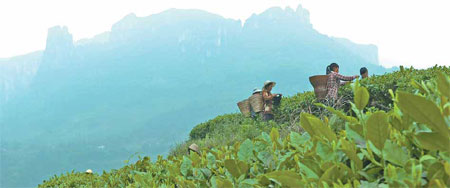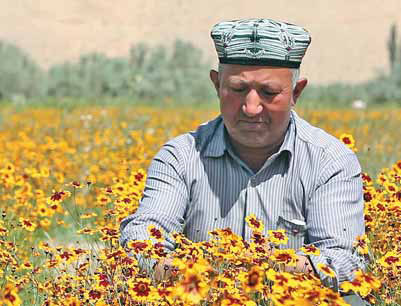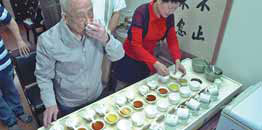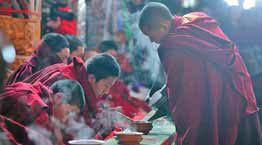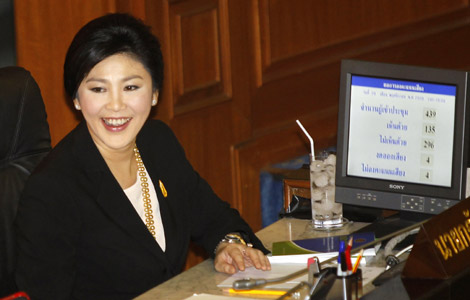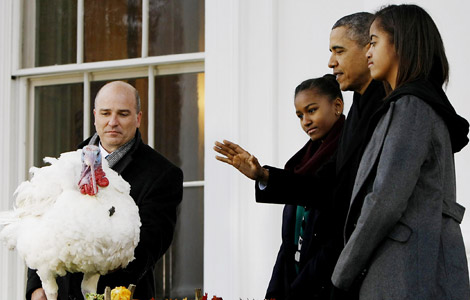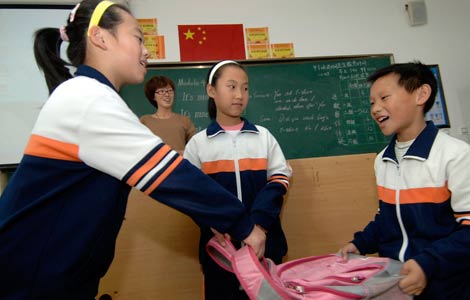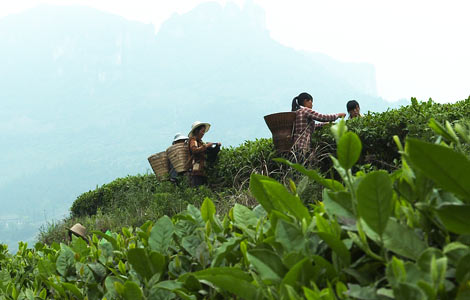Tea time
Updated: 2013-11-28 06:50
By Sun Li in Xiamen, Fujian (China Daily)
|
||||||||
Tea plays an important role in many cultures, from being part of religious ceremonies in Japan, to being a daily ritual for people in England. A new documentary explores how the drink affects the lives of millions of people. Sun Li reports in Xiamen, Fujian province.
Chinese people started to drink tea 2,000 years ago and The Classic of Tea, written by Lu Yu (AD 733-804) in the eighth century, elevated the humble beverage to an important part of Chinese culture. It is said tea was introduced to India in the Western Han Dynasty (206 BC-AD 24) and later spread around the world.
A new six-part documentary, Tea, The Story of a Leaf, explores how the universally loved and widely consumed beverage affects people's lives around the world. It premiered on CCTV-1 on Nov 18 and is now being aired on CCTV-9, the documentary channel.
Director Wang Chongxiao, a tea aficionado himself, says he was fed up with the stories told when the origin of a certain type of tea was introduced, which were always about legends involving gods or emperors.
"The deep mountains where the tea leaves were grown all seemed to be garnished with a mysterious veil. It sounds awesome but is surreal to me," Wang says.
Three years ago, Wang proposed the documentary to demystify tea and delve into the cultures surrounding the drink around the world.
The production team started shooting last March, traveling to 13 Chinese provinces including Fujian, Yunnan and Zhejiang, and seven foreign countries known for either their tea plantations or tea culture, such as England, India and Japan. Filming took over 18 months.
But the enormity of the subject meant a huge amount of homework had to be done before filming began. The research and consultation with tea experts, scholars and consultants started at the beginning of 2011.
Previous documentaries about tea usually followed a similar pattern, focusing on the history of tea and its intricate production procedure, Wang says.
"The program didn't continue the cliche. Instead, it centers on individuals whose lives are intertwined with tea - from tea growers to common tea drinkers. That was the tone we decided on during the brainstorming," Wang says.
About 800 people were interviewed. To find the right people in foreign countries, the team hired foreign directors and documentary makers to help with the research.
Some 60 characters were finally selected for the documentary, whose stories serve as the episodes' narrative threads.
The documentary focuses on some eminent figures in tea circles, such as Stephen Twining, the 10th-generation heir to the London-based tea maker Twinings, a Royal Warrant holder, and Zhang Tianfu, a 104-year-old tea expert who invented China's first tea-rolling machine.
But most of the subjects are common people whose lives are intertwined with tea, Wang says.
One episode followed a Tibetan's pilgrimage to Lhasa, capital of the Tibet autonomous region.
"In her long and exhausting journey, she had to draw energy from the yak-butter tea, which served as a strong back-up in her spiritual quest," Wang says.
As the woman proceeded in the religious fashion, the production team had to walk alongside her to record the trek. It took the crew more than 20 days to finish the 200-km journey.
Wang says at times the crew risked their lives for the shoot.
A dangerous cliff road challenged the team as they searched for snow chrysanthemum, a highly valuable plant grown in the Kunlun Mountains in the Xinjiang Uygur autonomous region. Chrysanthemum flowers are popular for herbal tea in China.
"The path is so narrow and everyone carries the equipment and moves very slowly," Wang says. "We faced the cliff and dared not look the other way, or the height may cause vertigo, which would be deadly."
CCTV-9 deputy-director Zhou Yan says the documentary presents tea in a novel way as it showcases the profoundly positive role tea can play in people's lives with various stories.
"Hopefully, the program will let those who didn't drink tea before understand tea and take a sip of the brew," Zhou says.
Ouyang Daokun, a tea scholar, says tea culture developed in China over thousands of years and the plant that originated in China has far-reaching effects on the lives of people across the globe.
While The Classic of Tea, the world's first monograph on tea was written by Lu Yu in the eighth century, The Book of Tea, an influential Japanese treatise on tea by Okakura Kakuzo, was composed in 1906, Ouyang notes.
"Today, the Japanese tea ceremony, which is deeply connected with aesthetics and Buddhism, could still find its roots in the two books that elevate the preparation and drinking of tea to a quasi-religious ceremony," he says.
Ye Qitong, a tea connoisseur who attended the 7th Cross-Straits Tea Expo held in Wuyi-shan, Fujian province from Nov 16 to 18, says people today are more aware of the health benefits of tea.
"That is why this year's tea expo held a specific tea health forum for the first time in its history," Ye says.
Statistics from the China Chamber of Commerce of Foodstuffs and Native Produce showed China's tea output reached 1.75 million tons last year, making the country the world's largest tea producer.
China's tea exports have reached more than 120 countries and regions worldwide. The value of tea exports last year climbed about 8 percent year on year to a record high of $1.04 billion.
Contact the writer at sunli@chinadaily.com.cn.
|
The six-part documentary Tea, The Story of a Leaf features some of the country's best-known tea plantations like this one in Enshi, Hubei province. Photos Provided to China Daily |
|
Snow chrysanthemum, which grows in the Kunlun Mountains in the Xinjiang Uygur autonomous region, is dried for a prized herbal tea. |
|
Zhang Tianfu, 104, is a tea expert who invented the country's first tea-rolling machine. |
|
Yak-butter tea serves as a source of energy for those on a spiritual quest in Tibet autonomous region. |
(China Daily 11/28/2013 page22)
Most Viewed
Editor's Picks

|

|

|

|

|

|
Today's Top News
IAEA team continues review of Fukushima plant
Sugar imports soar in China
Italy Senate expels Berlusconi from parliament
Obama calls Saudi king over Iran: White House
Skype changes partners in China
Biden’s China trip has broad agenda
Premier carries hectic schedule
China to be largest oil importer
US Weekly

|

|
